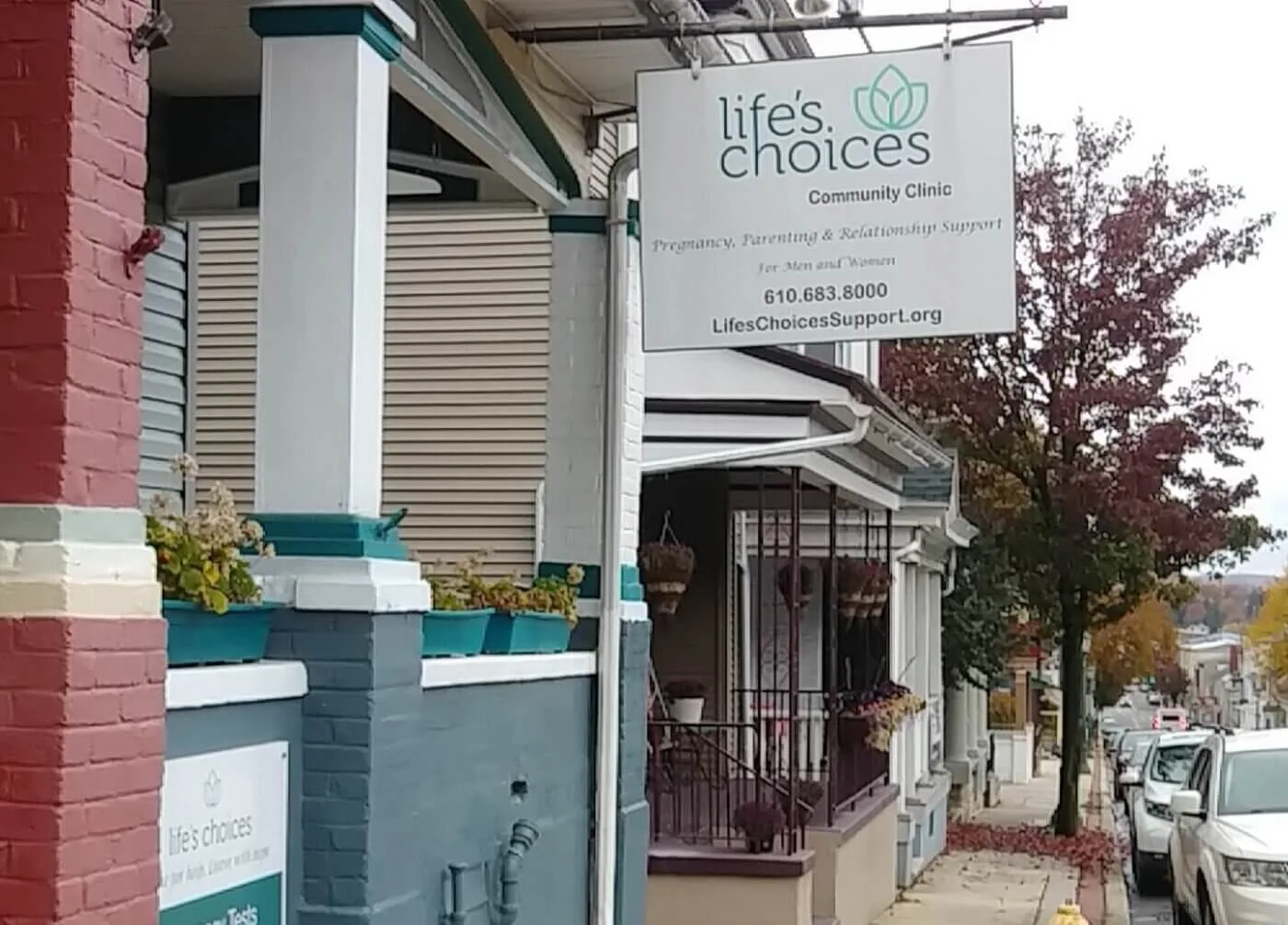
The Life's Choices crisis pregnancy center in Kutztown, Pa. (Photo: Ashley Adams)
Crisis pregnancy centers pose as full-service health clinics even though most don’t offer any type of medical services. Using deceptive marketing practices, CPCs lure pregnant individuals into their facilities in an attempt to dissuade them from obtaining abortion services.
They boast names such as Bright Hope, Problem Pregnancy, Choices Pregnancy Center, and Women’s Choice Network in bold letters across the front of their buildings. But despite promising abortion information and other reproductive resources, these facilities are actually designed to steer women facing unwanted pregnancies away from choosing an abortion.
These facilities are called crisis pregnancy centers (CPCs) and behind the doors of what are designed to look like full-service health clinics, staff members disseminate misinformation aimed at deceiving and manipulating women seeking abortion care. Considered to be the new “foot soldiers” of the anti-choice movement, CPCs far outnumber actual abortion clinics in Pennsylvania by a ratio of nine to one. There are 156 CPCs in the state and only 17 actual abortion clinics, according to a study conducted by The Alliance, an organization that advocates for women’s rights and gender equality.
“An unexpected pregnancy can be a scary situation and the need for prenatal care can lead many women to crisis pregnancy centers,” state Rep. Melissa Shusterman (D-Chester) said during a recent public hearing. “However, these centers—often tied to religious organizations—offer misleading healthcare information from volunteers without medical qualifications. Ultimately, their aim is to delay medical procedures until it is too late to legally terminate a pregnancy, which these centers never present as an option.”
Since the fall of Roe v. Wade at the end of June, sudden abortion bans and restrictions in certain states have made it necessary for more people to travel to Pennsylvania for abortion services. The influx of out-of-state patients has strained actual abortion clinics in the commonwealth as patient volume has almost tripled. Appointments are harder to obtain, leaving many to fall prey to the misleading mission of CPCs.
“The powers that be need to ensure consumers are protected from sham centers that spend millions of dollars on deceptive marketing to advertise themselves as healthcare centers when in fact they don’t actually provide such services,” Sen. Katie Muth (D-Berks) said during the same public hearing. “These deceptive practices can lead to human harm and even the death of an expecting mother because of a delay in care caused by these centers wasting precious time with sham guidance.”
The Mission of CPCs
CPCs are anti-abortion organizations that seek to reach low-income people facing unwanted or unintended pregnancies to prevent them from accessing abortion services and/or contraception, said Tara Murtha, director of Strategic Communications with the Women’s Law Project of Pennsylvania.
CPCs do provide counseling and other prenatal services but from an anti-abortion perspective, Murtha said. Most CPCs do not offer medical services and do not employ full-time medical staff but rather rely on volunteers who are not licensed or trained to deliver medical services and are not bound by medical, ethical, or regulatory standards. They lure in clients by marketing free medical services like “non-diagnostic” ultrasounds to give the false impression they offer legitimate medical services, Murtha said.
“Pennsylvania stands out as one of the most egregious states in terms of failing to hold CPCs
accountable for how they treat people, their impact on public health, and how they spend public funds,” Murtha said. “Pennsylvania should not be diverting public money away from serving constituents to help anti-abortion activists target Black women with medical disinformation and a snake-oil “treatment” considered an unethical experiment, not based on science, and not proven to be safe or effective.”
Since the 1960s, the primary strategy of CPCs for reaching low-income pregnant people has been to interfere as they search for legitimate medical care, according to Ashley Underwood, director of Equity Forward, an organization that produces investigative research on reproductive rights. Interference tactics by CPCs include opening facilities next to or near a legitimate medical provider—also called ‘co-locating’—as well as creating websites that mirror the imagery and language of legitimate medical facilities, and gaming Search Engine Optimization (SEO) so CPCs appear higher in online searches for abortion.
According to The Alliance study, the most common services offered by CPCs in Pennsylvania are pregnancy testing (88.5%) and ‘counseling’ (82.1%). The study found that almost 65% of CPCs in the state made false and biased claims.
“CPCs are not needed,” Underwood said. “They are not medical providers and don’t provide any medical services and they mislead people just to get them in the door.”
How are CPCs Funded?
Of the 156 CPCs in Pennsylvania, 27 of them (17%) are publicly funded through Real Alternatives, a private, nonprofit organization, Murtha said. The state government has diverted more than $144 million to the organization since the mid-1990s. This year, the state budget includes over $7 million for the organization.
The commonwealth does provide funding to some organizations that actually offer abortion services, such as Planned Parenthood, but that money is expressly allocated for family planning, not for abortions.
Murtha said Pennsylvania was the first state to use public funding for CPCs by diverting a portion of the state’s Temporary Assistance for Needy Families (TANF) funds. Currently, only 25 out of every 100 families that qualify for TANF in the commonwealth actually obtain assistance intended for pregnant women and children living in poverty.
“So where is Pennsylvania choosing to invest this money it is not giving to poor pregnant people, single mothers, and children?” Murtha said. “Some of it is directly funneled into the salaries and benefits of executives and staff at Real Alternatives. The rest goes to anti-abortion
activist programming without adequate oversight, regulation, or transparency.”
Underwood pointed out that five years ago, former state Auditor General Eugene DePasquale uncovered that Real Alternatives was using taxpayer money to expand its anti-abortion business nationally, specifically in Michigan and Indiana, which was a violation of its contract with the state. Yet the state continues to fund the organization.
Underwood’s group sued Pennsylvania in 2017 for information about how Real Alternatives distributes funds to service providers but a state court said the organization did not have to disclose that information.
“Now more than ever it is really important to shed the light on this,” Underwood said. “The state doesn’t have the infrastructure to provide proper maternity care to its residents, and now you have anti-abortion centers cropping up and taking public dollars. That money should be going to programs and clinics that need it and provide the services their patients need.”
The New Threat of CPCs Post-Roe
According to Murtha, CPCs are now functioning as surveillance infrastructure for the anti-abortion movement, amassing data that could be used in out-of-state abortion-related prosecutions and litigation.
The CPCs collect and store sensitive medical and personal data of the people who visit or interact with them, Murtha said. This data is often collected without the person’s knowledge. Since the data is stored by organizations not subject to medical privacy regulations, any and all of the information can be released at their discretion, she said.
“As abortion bans snap into place across the country, this unregulated data collection—initiated by the same movement lobbying to criminalize abortion and implement civil citizen vigilante abortion bans—is an acute concern,” Murtha said.
Politics

Malcolm Kenyatta makes history after winning primary for Pa. Auditor General
State Rep. Malcolm Kenyatta, who was first elected to the state House in 2018, won the Democratic nomination for Pa. Auditor General and will...

Biden administration bans noncompete clauses for workers
The Federal Trade Commission (FTC) voted on Tuesday to ban noncompete agreements—those pesky clauses that employers often force their workers to...

Philadelphia DA cancels arrest warrant for state Rep. Kevin Boyle on eve of Pa. primary
Philadelphia District Attorney Larry Krasner said a detective had sought the warrant against Boyle, a Democrat whose district includes a section of...
Local News

What do you know about Wawa? 7 fun facts about Pennsylvania’s beloved convenience store
Wawa has 60 years of Pennsylvania roots, and today the commonwealth’s largest private company has more than 1,000 locations along the east coast....

Conjoined twins from Berks County die at age 62
Conjoined twins Lori and George Schappell, who pursued separate careers, interests and relationships during lives that defied medical expectations,...






